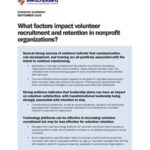Given many nonprofit service organisations rely on volunteers to provide valued services to their communities, examining the factors that impact the retention and recruitment of volunteers is of central importance for the success and longevity of many community-based services. Psychological ownership is a phenomenon whereby objects that are not physically or legally possessed can be the target of ownership feelings. While such psychological ownership has been examined in the paid-employment literature as an antecedent for prosocial behaviours, there has been no examination of psychological ownership within the volunteering literature. As such, this paper examines the role of psychological ownership as a factor in volunteer retention for predominantly community-based nonprofit service organisations by examining how the sense of ownership over the nonprofit service provider affects volunteering attitudes and intentions. Alongside ownership, previous volunteering behaviours, and time pressures are also examined as contributing factors. Results indicate that volunteering does increase ownership perceptions, and those ownership perceptions have positive outcomes for volunteering behaviours. However, time pressure is a significant moderator of these relationships and different volunteering behaviours can be observed for high and low time-pressured volunteers.
A Systematic Review on the Impact of Trauma-Informed Education Programs on Academic and Academic-Related Functioning for Students Who Have Experienced Childhood Adversity
The purpose of this study was to conduct a systematic review of the existing literature regarding trauma-informed education programs and their impact on academic and academic-related outcomes. The articles included for review (n=15) contained data on trauma-informed education programs implemented in preschool, primary/elementary, and high school settings. Academic and academic-related outcomes reported included attendance, disciplinary…

